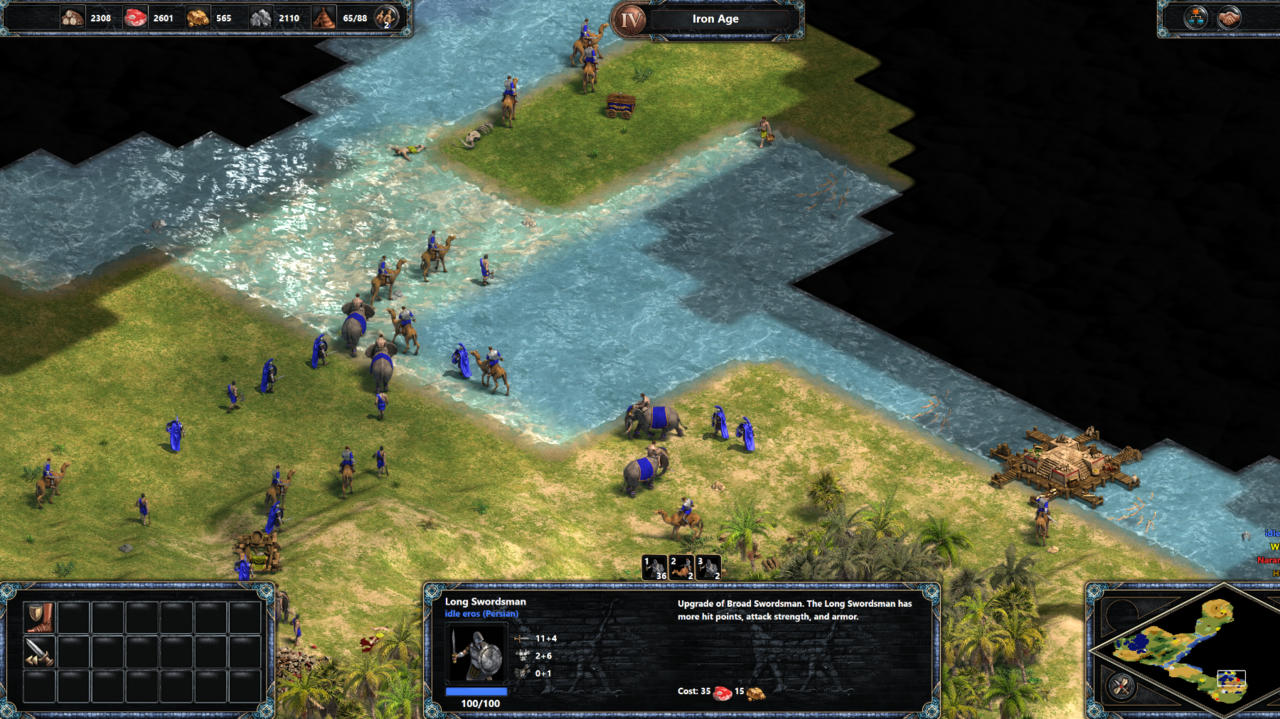Booting up Age of Empires: Definitive Edition for the first time is immediately surprising. The original game launched more than two decades ago, but it's been refined and revived for 2018, ready for modern audiences--or at least old players with new PCs and missing CD keys. It begins with pomp as a curt opening trailer plays, showing off the upgraded visuals and the new, orchestral score. As a returning player, that moment feels like coming home.
Starting with the launch of Age of Empires II: HD Edition, Microsoft Game Studios has been working to update the series, even adding plenty of new content. Now, the game that started it all has been remastered in 4K, with new narration and slight gameplay tweaks rounding out the list of improvements. Even with all that, though, the core play hasn't been meaningfully altered, leaving it to feel relatively quaint by modern standards: You simply command troops to gather resources, chop wood, build out a base, and conquer nearby enemy strongholds. That's great for some purists, but it does put Age of Empires: Definitive Edition in the awkward position of having to stand on some old and tired legs. Thankfully, the majority of the game makes the leap well enough.
Not keen on tackling the whole of human history in one game, as with Rise of Nations or Civilization, Age of Empires games focus on limited timelines--for instance, the Ancient and Classical ages at play here. You aren't some disembodied leader looking to lead your people to an overarching victory against all others--you're just trying to survive and not be wiped from the history books.
In the Egyptian campaign, your work revolves around supporting one of the first Pharaohs, Narmer, to help him marshal the political and material strength needed to unite the early Egyptian Empire, thousands of years before the rise of Rome. That gives you immediate, tangible goals to pursue, allowing you to feel effective and influential.
Where those sort of history lessons fade into the background, of course, is in the open-ended multiplayer. You'll see the Egyptians fielding Roman legionnaires, even though that doesn't make sense. Nor does the troop progression of Hoplite, to Phalanx, to Roman Centurion, which implicitly suggests a linear path through history that both didn't happen and doesn't add up. But, again, this game hails from 1997, a year before Starcraft, when the idea of having factions with unique traits in strategy games was only just being considered.
It's hard to say whether that's an issue that you will personally find bothersome, but it's a strong example of the game's old-school foundation. While not everything in the game has been refreshed, all the things that were, however, are stellar.
Visual upgrades aside, small tweaks to sound effects as well as myriad gameplay adjustments are the real stars of this remaster. The expanded multiplayer mode in particular get high marks. It's simple and quick, allowing you to jump into a match less than 30 seconds after opening the game. Boosted population limits (all the way up to 250) allow much larger and more chaotic battles than before.

The in-game scenario editor, too, offers up some powerful level-building and even campaign-creation tools. It's a bit complex, requiring you to have an external file organization system for your campaign maps and the like, but it's still quite robust for those who want it. Just about all the tools you need to design your own entire plots are there, too. You can, with some effort, create a historical campaign more-or-less akin to what you’d play in the main game. Or you can get silly with it and have a map made of forests where players will have to log their way to a foe, opening up some very unusual tactics and strategies.
Other changes might not get quite the same fanfare but are nonetheless vital to keeping Definitive Edition relevant. Improved pathfinding, tools for locating stray villagers and military, attack-move commands, and plenty more have all been folded into the remaster, making for an impressive bump to general feel and smoothness of the game.
Unfortunately, there's still a lot that just isn't quite there, by modern standards. The limited units--particularly the lack of unique ones for each faction--can make play feel homogenous very quickly. Structures aren't as developed either, meaning your ability to run more complex strategies is limited. You won't find extensive unit queuing, hotkeys, shift-commands, or any of the countless gameplay improvements RTS designers have come up with over the intervening decades.
If you're set on playing the original Age of Empires, this is far and away the best way to do so. That said, real-time strategy is a very feature-heavy genre. While this is the tightest the original AoE has ever been, it’s still sluggish and stripped-down compared to almost any modern offering.













